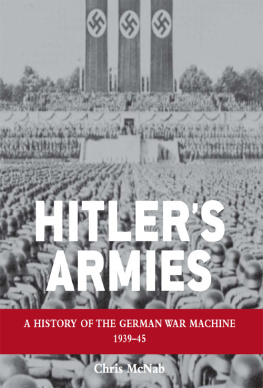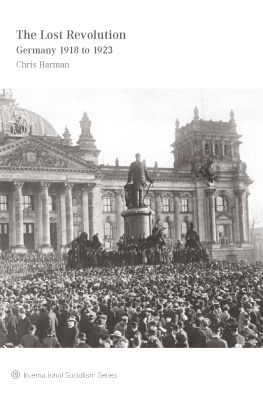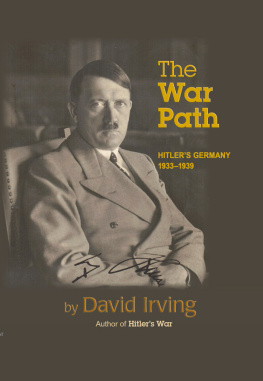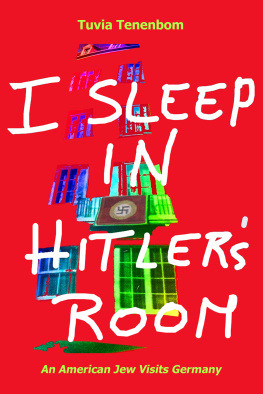Chris Mann - Inside Hitlers Germany
Here you can read online Chris Mann - Inside Hitlers Germany full text of the book (entire story) in english for free. Download pdf and epub, get meaning, cover and reviews about this ebook. year: 2014, publisher: German War Machine, genre: Non-fiction. Description of the work, (preface) as well as reviews are available. Best literature library LitArk.com created for fans of good reading and offers a wide selection of genres:
Romance novel
Science fiction
Adventure
Detective
Science
History
Home and family
Prose
Art
Politics
Computer
Non-fiction
Religion
Business
Children
Humor
Choose a favorite category and find really read worthwhile books. Enjoy immersion in the world of imagination, feel the emotions of the characters or learn something new for yourself, make an fascinating discovery.

- Book:Inside Hitlers Germany
- Author:
- Publisher:German War Machine
- Genre:
- Year:2014
- Rating:5 / 5
- Favourites:Add to favourites
- Your mark:
- 100
- 1
- 2
- 3
- 4
- 5
Inside Hitlers Germany: summary, description and annotation
We offer to read an annotation, description, summary or preface (depends on what the author of the book "Inside Hitlers Germany" wrote himself). If you haven't found the necessary information about the book — write in the comments, we will try to find it.
Inside Hitlers Germany — read online for free the complete book (whole text) full work
Below is the text of the book, divided by pages. System saving the place of the last page read, allows you to conveniently read the book "Inside Hitlers Germany" online for free, without having to search again every time where you left off. Put a bookmark, and you can go to the page where you finished reading at any time.
Font size:
Interval:
Bookmark:
Each chapter of this book opens with a high-quality contemporary photograph. Click or tap on the photograph to see a detailed caption, then click or tap on the 'return' link to go back to the chapter. If your e-reader does not allow internal links, the caption pages can usually be found at the very end of the book, beyond the imprint page.
Like many Nazis, Adolf Hitler, born on 20 April 1889, came from Austria. He was also a misfit. His early years are well documented. He was born at Branau am Inn in Austria on the border with Germany in 1889, the son of an Austro-Hungarian customs official, Alois Hitler, aged 52, and a peasant girl, Klara Plzl, some 30 years his junior. In 1876, Alois had changed his name from Schicklgruber to Hitler because the former sounded coarse and rustic. In this region of the Austro-Hungarian Empire, the names Hiedler, Hietler, Httler, Htler and Hitler, denoting smallholder, were all used interchangeably. Alois was illegitimate, and Hiedler was the surname of his stepfather.
Hitlers childhood was not easy. While his mother doted on him, his father was a strict and difficult man. Alois was the archetypal middle-ranking provincial civil servant: he was frugal, strict, pedantic, pompous, lacking in humour and status-conscious. Alois took little interest in his family, preferring to spend time in the bar drinking and smoking, or indulging his passion for beekeeping. Thrice married, Alois was an unsympathetic man and his use of physical punishment may well have had a profound impact on his son Adolf. It probably contributed to Adolfs patronizing contempt for submissive women, a desire to dominate, his inability to form deep personal relationships, and his immense capacity for hatred. From an early age, Adolfs strong will clashed with his fathers, a clash that invariably led to the young Adolf being thrashed. As Adolfs younger sister Paula later remembered: It was especially my brother Adolf who challenged my father to extreme harshness and who got his sound thrashing every day How often, on the other hand, did my mother caress him and try to obtain with her kindness what my father could not succeed [in obtaining] with harshness.
Neither was Adolfs education a success. His father moved as part of his job, which disrupted the childrens schooling. Eventually, in 1900, Adolf moved from elementary to secondary school. Hitlers father had opted for the realschule rather than the gymnasium. The realschule had a more vocational and less traditional emphasis, and reflected Adolfs fathers view that classical and humanistic subjects were of little use in looking for a job. At secondary school Hitler did not excel; he performed poorly academically, was unruly and in constant trouble with teachers who attempted to control him. Hitler left school with an unbending dislike of schooling and teachers. This contempt for academic endeavour and all things intellectual would find its fullest expression in Nazism. Most of my teachers, Hitler remarked, had something wrong with them mentally, and quite a few of them ended their days as honest-to-God lunatics. The only subject that Hitler did find of interest during and after school was Germany: he soaked up books in the public library on all things German.
In 1907 Hitler went to Vienna where he attempted to enter the Vienna Academy of Fine Arts. However, he failed the entrance test another blow to him and a further source for his hatred of teachers and intellectuals. The following year his mother died, and in the years afterwards through to the outbreak of World War I Hitler eked out an existence in Vienna (and Munich from 1913 to 1914). The future chancellor of Germany was reduced to sleeping in dosshouses, and with his long overcoat, long hair and unshaven appearance, fellow down-and-outs gave him the nickname of Ohm Paul Krger, after the Boer leader of the period. Hitler was, however, not the down-and-out he liked to subsequently portray. His standard of living improved with some handouts from his aunt, a legacy from his mother and with the proceeds from his sketches, for which he could get five kronen per picture. At times his income was equivalent to that of a junior teacher; at other times he was short of money. Looking overall at the six years that Hitler spent in Vienna, one would have to conclude that his life in the Austrian capital was not easy.
The traditional view is that Hitler developed his anti-semitism in Vienna. However, it is not as clear cut as this. Many of the art dealers through whom Hitler sold his pictures were Jews. Hitler himself felt that the Jews he dealt with were better business people and more reliable than the Christian dealers; he even struck up a good friendship with one Jewish dealer, Josef Neumann. However, Hitler later claimed in Mein Kampf that he became anti-semitic after coming to Vienna from Linz. Hitler remarked on one particular episode: Once as I was strolling through the inner city, I suddenly encountered an apparition in a black caftan and black hair locks. Is this a Jew? was my first thought. For to be sure, they had not looked like that in Linz. I observed the man furtively and cautiously, but the longer I stared at this foreign face, scrutinizing feature for feature, the more my first question assumed a new form: Is this a German? Following this encounter, Hitler began to see Vienna in a different light: Wherever I went, I began to see Jews, and the more I saw, the more sharply they became distinguished in my eyes from the rest of humanity. Gradually, everything Hitler hated about the decaying Austro-Hungarian Empire he associated with the machinations of Jewry. Hitler also began to associate Marxism with Jewry through what he called the Jewish doctrine of Marxism.
There is, however, little reliable confirmation of Hitlers anti-semitism in this period, while his friendships with some Jews actually point in the other direction. Hitlers World War I comrades also attested to the fact that he expressed no notable anti-semitic views. Therefore, the current view on Hitler is that his rabid anti-semitism, that he claimed was formed in pre-war Vienna, was, in fact, largely a product of post-1918 Germany. To bolster the image that Hitler portrayed of himself as a self-made man brought up in poverty, it suited his purposes to stress his days of trial in Vienna. In fact, his pathological hatred of Jews (and Marxists) seem to have stemmed more from his experience of a defeated Germany in 1918 and his life as a rabble-rouser in Weimar Germany than his pre-war years in the decaying Austro-Hungarian Empire.
In August 1914, following the assassination of the Archduke Franz Ferdinand, war erupted in Europe. The war shattered the old world and proved to be a formative experience for men drawn into the conflict, such as Hitler and Benito Mussolini in Italy. Ex-servicemen formed the backbone of the post-war fascist movements. Had war not broken out in 1914, Hitler would probably have eked out the rest of his life as a second-rate, obscure painter. But fated dictated otherwise.
As an Austrian (and someone who had avoided military service in the Austro-Hungarian Army), Hitler had to petition the ruler of Bavaria, King Ludwig III, to join the Bavarian part of the German Army. All-in-all, the war was a Godsend for Hitler and marked the end of his period of idleness after leaving home in 1907. For the first time, Hitler had a cause, comrades and discipline. It was his first real job. He was desperate to stay with his regiment, the Bavarian Reserve Infantry Regiment 16 (known as the List Regiment after its commander), even after he had been wounded. Hitler later referred to the war years as the greatest and most unforgettable time of my earthly life.
Font size:
Interval:
Bookmark:
Similar books «Inside Hitlers Germany»
Look at similar books to Inside Hitlers Germany. We have selected literature similar in name and meaning in the hope of providing readers with more options to find new, interesting, not yet read works.
Discussion, reviews of the book Inside Hitlers Germany and just readers' own opinions. Leave your comments, write what you think about the work, its meaning or the main characters. Specify what exactly you liked and what you didn't like, and why you think so.





